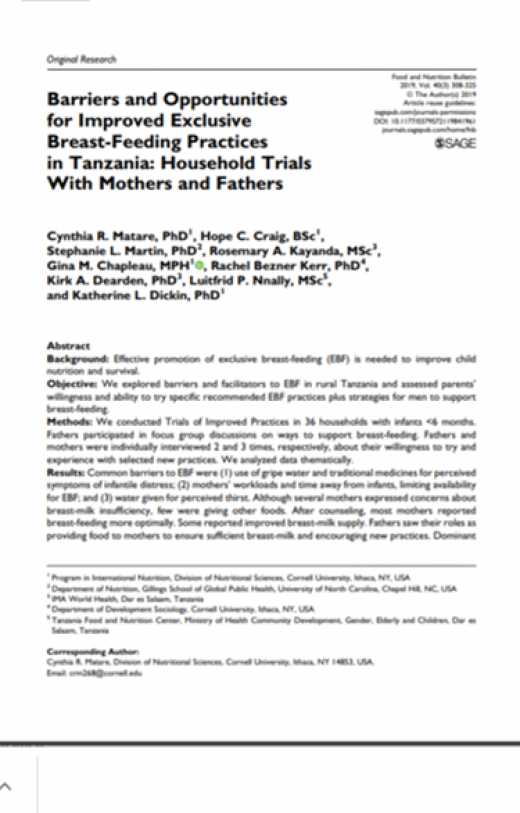Barriers and opportunities for improved exclusive breastfeeding practices in Tanzania: Household trials with mothers and fathers
Peer Reviewed Articles
Barriers and opportunities for improved exclusive breastfeeding practices in Tanzania: Household trials with mothers and fathers
Abstract
Background: Effective promotion of exclusive breast-feeding (EBF) is needed to improve child nutrition and survival.
Objective: We explored barriers and facilitators to EBF in rural Tanzania and assessed parents’ willingness and ability to try specific recommended EBF practices plus strategies for men to support breast-feeding.
Methods: We conducted Trials of Improved Practices in 36 households with infants <6 months. Fathers participated in focus group discussions on ways to support breast-feeding. Fathers and mothers were individually interviewed 2 and 3 times, respectively, about their willingness to try and experience with selected new practices. We analyzed data thematically.
Results: Common barriers to EBF were (1) use of gripe water and traditional medicines for perceived symptoms of infantile distress; (2) mothers’ workloads and time away from infants, limiting availability for EBF; and (3) water given for perceived thirst. Although several mothers expressed concerns about breast-milk insufficiency, few were giving other foods. After counseling, most mothers reported breast-feeding more optimally. Some reported improved breast-milk supply. Fathers saw their roles as providing food to mothers to ensure sufficient breast-milk and encouraging new practices. Dominant roles and work away from home were barriers even if fathers were willing to help with household chores. Fathers mostly provided emotional support or encouraged others to help with chores.
Conclusion: Exclusive breast-feeding promotion needs to address concerns about infantile distress and help parents develop effective soothing techniques while avoiding nonprescribed medicines. Engaging men in EBF interventions could help change social norms and facilitate men’s involvement in improving breast-feeding practices.
Read the article

